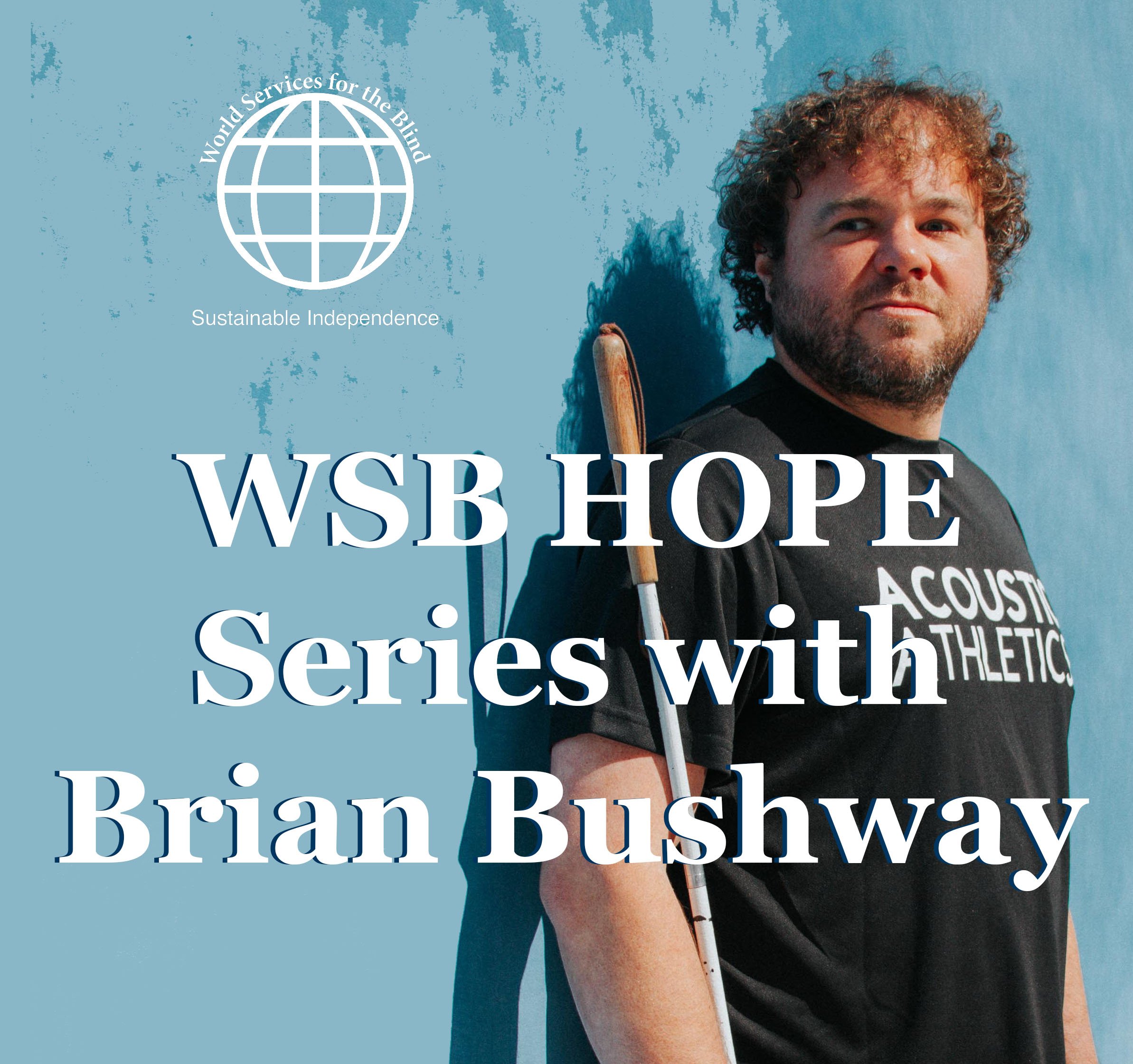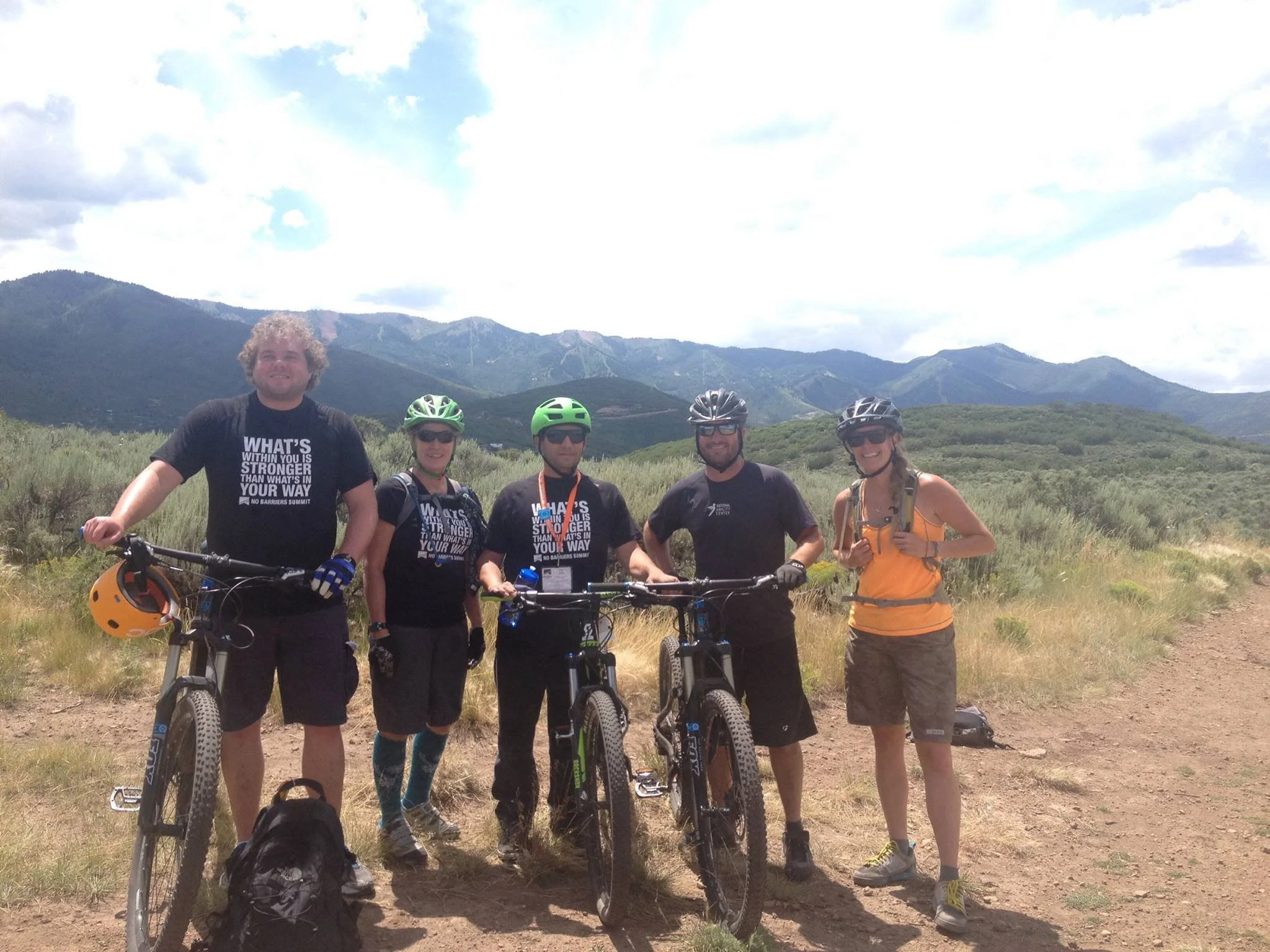HOPE Series with Brian Bushway
/Interview with Brian Bushway, a leader in Echolocation
Headshot of Brian against a blue background with text “WSB HOPE INTERview with brian bushway”
Welcome back to another installment of the HOPE (Hanging onto Positive Expectations) Series! There are so many individuals doing great things for the Blind and Visually Impaired Community that we wanted to highlight and share their stories. We hope these stories can also serve as inspiration for those with vision loss and to remind us that there are so many people working towards a common goal of helping those who are blind and visually impaired. This month we are featuring Brian Bushway – a blind athlete, Orientation and Mobility Instructor, and leader in the field of Echolocation.
One of Brian’s biggest passions, and what has allowed him a lot of opportunities in life, is questioning and learning about the neuroplasticity of the brain and how the senses develop. Through learning and exploring the senses, specifically through echolocation, he has even developed a program for sighted athletes to learn and develop their other senses.
Losing His Vision
Brian has done a lot of extraordinary things in his life from learning to mountain bike without sight to traveling around the world, but his story is not unlike a lot of the clients of World Services for the Blind. As a middle schooler, Brian went from having a lot of functional vision to having no light perception in the span of a few years. A challenge many of our students know well at WSB! Vision loss can happen quickly and suddenly. And for Brian, he had no idea where to turn.
“When it first happened, I couldn’t find my way out of my bedroom”
When he first lost his light perception, he was paralyzed by fear. Like a lot of us, he didn’t know any other people who were blind or visually impaired. His parents were lost on what to do as well. But what surprised him as being the most confusing part was that his social environment changed as well. As a middle schooler and high schooler now using a white cane, he was not sure how to navigate the social cues around him.
But he knew there was something deeper inside of him. He knew if nothing changed, he would stay afraid and stuck in his house. He was able to become more curious about how other blind and visually impaired people were having full lives. A similar theme to our last HOPE Interview with Joey Stuckey, the blind musician, Brian just started trying and learning O&M, Braille, Assistive Technology, etc. But he still felt like something was missing – “the social, emotional, and psychological factors were the bigger barriers”. He realized he was internalizing everyone else’s anxiety and from that realization, he was able to separate his own thoughts and feelings from the social norms.
“The tragedy was that the people around me didn’t expect the same things from me. So, I had to have high expectations for myself”
He was able to pull himself out of the fear and see a bigger future for himself, something we try to help our students learn every day at WSB.
“The best long-term solution for changing a prejudice is to find creative ways to serve people around you” A similar story to one we hear at WSB, Brian had to really advocate for himself to be able to be independent. He craved the independence and to be the caregiver, not the other way around for people to do everything for him. This attitude can change things for those with disabilities, embracing our independence and realizing what we CAN do.
brian and a group on mountain bikes smiling in front of mountains
From a Scared Student to a Leader in Echolocation
When Brian was in school, he started to understand passive echolocation. His brain was experiencing the environment through echolocation, but he didn’t have the language to talk about it or understand it. When he started to learn more about echolocation, he was able to understand an active way to use it – the sound reflecting off of objects and how it creates a 3D depiction of what’s around.
Brian says the way he really learned to utilize echolocation was through just exploring and playing. He had to get out and explore his surroundings. He wanted to keep up with his peers so he “took a risk and threw himself into the mix”.
During college he was able to study abroad several times where he really learned to develop his skills in new environments. His ultimate goal was he wanted to learn to get around new environments by myself. It was not without mistakes and trials, but they were such a huge learning curve that helped him never make those mistakes again.
From all of his hard work and studies (Brian is a certified Orientation & Mobility Instructor in California) he has been able to travel all over the world working with special needs children teaching them the skills to become independent. From the jungles of Belize to Thailand, he has worked all over the world to develop these skills and help those with disabilities to develop these skills in all different types of environments.
With echolocation, Brian emphasized this is just another way to experience the world. A way to sightsee across the world in a totally different and unique way.
“There is a world of acoustic beauty.”
Professional athletes started to hear his stories and wanted to learn how to use their other senses. “All of our other senses are adding to experiences, our brains just want to have the quickest way to label it with our vision. A lot of people don’t have a good understanding about how we use our other senses to construct our reality as opposed to just using our vision”. Brian was able to understand there was a huge gap of knowledge and that he could capitalize on that and work with people to highlight their other senses. Now with Acoustic Athletics he works with professional athletes of all kinds to develop their senses and help them learn about the parts of themselves they had no idea they could utilize when they may have previously relied purely on their sight.
We wanted to share Brian’s story on the blog because he exemplifies what you CAN do as a person who is blind and visually impaired. We also love how Brian has thought outside of the box to bring awareness about the blind community to the sighted world.



